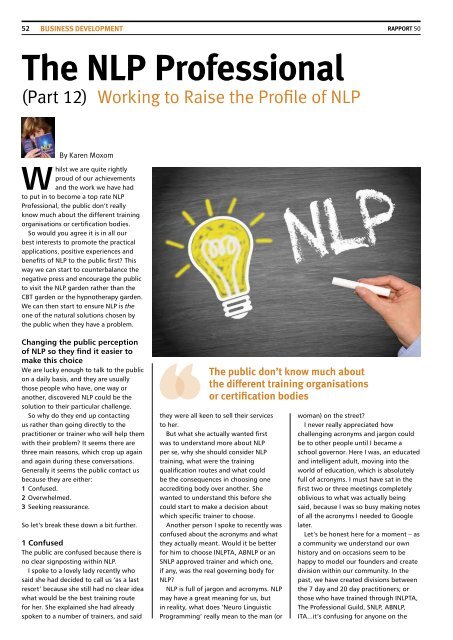Rapport
1UX3XUb
1UX3XUb
You also want an ePaper? Increase the reach of your titles
YUMPU automatically turns print PDFs into web optimized ePapers that Google loves.
52 business development<br />
RApport 50<br />
The NLP Professional<br />
(Part 12)<br />
Working to Raise the Profile of NLP<br />
By Karen Moxom<br />
Whilst we are quite rightly<br />
proud of our achievements<br />
and the work we have had<br />
to put in to become a top rate NLP<br />
Professional, the public don’t really<br />
know much about the different training<br />
organisations or certification bodies.<br />
So would you agree it is in all our<br />
best interests to promote the practical<br />
applications, positive experiences and<br />
benefits of NLP to the public first? This<br />
way we can start to counterbalance the<br />
negative press and encourage the public<br />
to visit the NLP garden rather than the<br />
CBT garden or the hypnotherapy garden.<br />
We can then start to ensure NLP is the<br />
one of the natural solutions chosen by<br />
the public when they have a problem.<br />
Changing the public perception<br />
of NLP so they find it easier to<br />
make this choice<br />
We are lucky enough to talk to the public<br />
on a daily basis, and they are usually<br />
those people who have, one way or<br />
another, discovered NLP could be the<br />
solution to their particular challenge.<br />
So why do they end up contacting<br />
us rather than going directly to the<br />
practitioner or trainer who will help them<br />
with their problem? It seems there are<br />
three main reasons, which crop up again<br />
and again during these conversations.<br />
Generally it seems the public contact us<br />
because they are either:<br />
1 Confused.<br />
2 Overwhelmed.<br />
3 Seeking reassurance.<br />
So let’s break these down a bit further.<br />
1 Confused<br />
The public are confused because there is<br />
no clear signposting within NLP.<br />
I spoke to a lovely lady recently who<br />
said she had decided to call us ‘as a last<br />
resort’ because she still had no clear idea<br />
what would be the best training route<br />
for her. She explained she had already<br />
spoken to a number of trainers, and said<br />
The public don’t know much about<br />
the different training organisations<br />
or certification bodies<br />
they were all keen to sell their services<br />
to her.<br />
But what she actually wanted first<br />
was to understand more about NLP<br />
per se, why she should consider NLP<br />
training, what were the training<br />
qualification routes and what could<br />
be the consequences in choosing one<br />
accrediting body over another. She<br />
wanted to understand this before she<br />
could start to make a decision about<br />
which specific trainer to choose.<br />
Another person I spoke to recently was<br />
confused about the acronyms and what<br />
they actually meant. Would it be better<br />
for him to choose INLPTA, ABNLP or an<br />
SNLP approved trainer and which one,<br />
if any, was the real governing body for<br />
NLP?<br />
NLP is full of jargon and acronyms. NLP<br />
may have a great meaning for us, but<br />
in reality, what does ‘Neuro Linguistic<br />
Programming’ really mean to the man (or<br />
woman) on the street?<br />
I never really appreciated how<br />
challenging acronyms and jargon could<br />
be to other people until I became a<br />
school governor. Here I was, an educated<br />
and intelligent adult, moving into the<br />
world of education, which is absolutely<br />
full of acronyms. I must have sat in the<br />
first two or three meetings completely<br />
oblivious to what was actually being<br />
said, because I was so busy making notes<br />
of all the acronyms I needed to Google<br />
later.<br />
Let’s be honest here for a moment – as<br />
a community we understand our own<br />
history and on occasions seem to be<br />
happy to model our founders and create<br />
division within our community. In the<br />
past, we have created divisions between<br />
the 7 day and 20 day practitioners; or<br />
those who have trained through INLPTA,<br />
The Professional Guild, SNLP, ABNLP,<br />
ITA...it’s confusing for anyone on the


